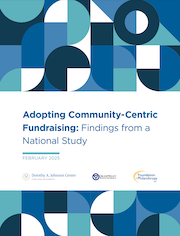Site Search
- resource provided by the Forum Network Knowledgebase.
Search Tip: Search with " " to find exact matches.

CNJG’s Newark Philanthropic Liaison, Kevin Callaghan, organized a series of webinars for our Newark Funders Affinity Group and other funders to know the specific challenges of New Jersey’s largest city responding to the COVID-19 pandemic. Guest speakers included, Mayor Ras Baraka, Newark Public Schools Superintendent Roger Leon, consulting firm McKinsey & Co., and Catherine Wilson, CEO of United Way of Greater Newark.
Facing Our Future was a landmark initiative looking at the systemic, long term fiscal challenges facing all levels of government in New Jersey. It grew out of a 2010 briefing CNJG held for members that outlined how a Governor’s budget is annually crafted. CNJG leadership worked with members to convene a group of enthusiastic former government leaders. Their collective experience crossed party lines, and many of them had served multiple New Jersey governors. This Leadership Group included 4 former Attorney Generals, 3, former Commissioners, 2 former State Treasurers, a former Director of the State Senate and a former Chief Justice of the NJ Supreme Court, in addition to leading New Jersey researchers.
Facing Our Future became an independent, bipartisan effort under the auspices of CNJG. It has produced 3 different reports that centered on the same theme.

From forest fires in Canada and Greece to massive floods in Vermont and California – not to mention scorching heat waves across the globe – recent events underscore the fact that climate disasters are an inevitable part of our future. It is estimated that over 2 billion people will be at risk of exposure to intense heat by the end of the century. Here in the U.S., the Census Bureau indicates that one in four residents are socially vulnerable to extreme heat waves. In the U.S., people of color are disproportionately impacted by climate change due to their occupations. Non-citizens and Latino workers, who make up more than 75% of agricultural workers, are twenty times more likely to die from heat-related illnesses than the general population. Meanwhile, Black people are 40% more likely to live in areas with the highest estimated increases in mortality rates due to changes in temperature.
Regional inequities also play a role in which parts of the U.S. will be most impacted by climate change. Geographies that naturally have hot climates, such as the Southeast U.S. region, will only get hotter. According to a new index created by Texas A&M University and the Environmental Defense Fund, those who reside in that region will be most susceptible to future climate disasters. These vulnerabilities are exacerbated by a lack of political will which makes it challenging to implement comprehensive long-term strategies that meet the needs of diverse communities.
However, there is still time to prevent the worst impacts of climate change. Climate justice leaders and organizations are working tirelessly to develop the social and economic infrastructure needed to help protect the communities most at risk of experiencing the worst effects of environmental disasters. Join us for a timely discussion with experts from the climate justice movement on their strategies for building climate resilience in the South and learn how philanthropy can invest in transformative solutions to lessen the harms of climate change on immigrant and BIPOC communities.
There is no cost to attend for CNJG members.
As artificial intelligence (AI) and technological advances take on an increasingly prominent role in our society, BIPOC and immigrant communities face the threat of biases and outright hostilities being encoded and automated into surveillance, enforcement, and judicial tools. At the same time, creative leaders in the nonprofit sector are leveraging and building new technologies to better deliver culturally responsive services at scale to their communities. In this two-part series on the intersection of AI, technology and immigrant justice, GCIR invites funders to deepen their knowledge in the space as well as gain insights on how philanthropy can deploy investments that build the movement’s capacity to respond to emergent threats and opportunities.
Part 2: Tech for Good: Building Innovative Tools to Serve Immigrant Communities
In the hands of creative and justice-driven leaders, computer technologies hold significant potential for advancing the public good. Across the country, nonprofits are harnessing the power of AI and building innovative tech tools to bridge gaps in culturally responsive services while expanding their organizational impact. From accessible legal tools, to on-demand translation services, to tech-based workforce development, the movement for immigrant justice is leveraging technology in creative ways to transform and scale service delivery. In this discussion, funders will learn from talented innovators about the tools they have built and how philanthropic investments can catalyze this burgeoning field.
Speakers:
Swapna Reddy, Co-Founder & Executive Director, ASAP
Daisy Magnus-Aryitey, Co-Founder & Co-Executive Director, Code the Dream
Bartlomiej Skorupa, Co-Founder & Chief Operating Officer, Mobile Pathways
Alex Mitchell, Product Manager, Tarjimly



